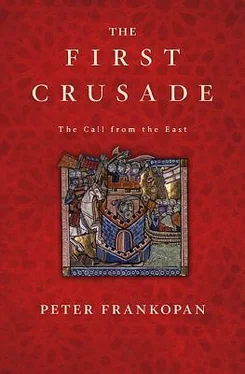Some Byzantine commanders were actually flourishing in the eastern provinces – most notably Philaretos Braakhamios, a talented general whose career had suffered a serious setback after refusing to support Romanos IV Diogenes’ successor, Michael VII Doukas, when he became emperor in 1071. As the empire imploded with one revolt after another in the 1070s, Philaretos wrested control of many towns, forts and territories and built up a substantial power base in the process. He continued to prosper after Alexios became emperor, and by the early 1080s held the important cities of Marash and Melitene as well as much of Cilicia, before becoming master of Edessa in 1083. 6
The Alexiad ’s sweeping – and damning – account of the situation in the east has shaped modern opinions about the situation in Asia Minor at the time of Alexios’ seizure of power. A common consensus has emerged that the eastern provinces were overrun by the Turks in the early 1080s. There is also wide agreement, likewise based on Anna Komnene’s account, that there was a significant Byzantine recovery on the eve of the First Crusade which, taken together with the death of the sultan of Baghdad in 1092, provided an inviting and enviable opening for the empire to exploit in Asia Minor. 7Yet commentary provided by the Alexiad needs to be treated cautiously for the author’s aim in stressing the parlous state of the empire in 1081 was to underline Alexios’ achievements, to emphasise that he saved Byzantium from the very brink of disaster. There was a darker motivation as well: to absolve the emperor of blame for a series of major disasters which occurred not before he took the throne, but afterwards – and which are cleverly concealed in Anna’s history.
Yet even the Alexiad inadvertently reveals the strength of the empire’s position in 1081. As the new emperor prepared to deal with the Norman invasion of Epirus he put together as large an army as he could, summoning men from all over the empire to gather in Constantinople. This included the withdrawal of men stationed in Asia Minor: Alexios ‘realised that he must quickly recall all the toparkhes [senior officers] in the east, men who as governors of forts or towns were bravely resisting the Turks’. At once, the emperor gave orders that these commanders, in provinces like Paphlagonia and Cappadocia, secure their respective regions, ‘leaving for that purpose enough soldiers, but with the rest they were to come to Constantinople, bringing with them as many able-bodied recruits as they could find’. 8There were officers in other regions in Asia Minor as well who were also holding out against the Turks, and they too were ordered to send men to a new emperor preoccupied with preparing a large army to deal with the attack by the Normans. 9This freeing-up of manpower in Asia Minor suggests that the Byzantine hold over the region was fairly robust.
In fact, there is little to suggest that the Turks posed a major problem in this period. There were bands of raiders who were a menace, attacking soft targets like Kyzikos, which were poorly defended and offered little resistance. 10But even the presence of such opportunistic groups was not necessarily unwelcome: when one aristocrat came across a party of Turks while on his way to join Alexios and Isaac Komnenos during their rebellion, he did not engage them in combat but persuaded them to join him as mercenaries. 11
Other evidence too presents a picture sharply at odds with the idea that the Byzantine east had collapsed by the time of Alexios’ usurpation. For example, Attaleia, an important trading post and naval base on the south coast of Asia Minor, was raised in status to an archbishopr ic in the early 1080s, a sign that the town was not only still in Byzantine hands but growing in importance. 12Archaeological finds reveal the existence of an extensive cast of bishops, judges and officials holding positions in many provinces and towns in Asia Minor immediately before Alexios came to the throne as well as afterwards, which demonstrates that the damage done by the Turks to the provincial administration around this time was hardly extensive. 13
In fact, the situation in the east improved significantly after Alexios took power, with the return of stability to much of Asia Minor during the first half of the 1080s. This was a major achievement, especially in view of the fact that Alexios’ regime had been so fragile at the outset: there had been concerns about the loyalty of his own troops during the entry to Constantinople in 1081, while some of his most prominent supporters considered abandoning him soon after. His failure to have his wife, Eirene, crowned empress alongside him provoked a violent reaction from her powerful family, who bristled at Alexios’ attempt to show himself to be independent. Their menacing warnings had the desired effect: Eirene was crowned a week later. 14In addition, Constantinople’s high-ranking clergy had been demanding a public apology – as well as penance – from Alexios for the behaviour of his men after they rampaged through the capital during his coup. 15And as we have seen, the western flank of the Byzantine Empire was in chaos in the early 1080s with a major Norman invasion of Epirus under way and Pecheneg raids devastating the Balkans in the north.
When it came to Asia Minor the emperor was less concerned with the Turks than with the more significant problem posed by this region in the previous decade: uprisings by Byzantine aristocrats. The eastern provinces were home to most of the major landowners in Byzantium, and had proved a fertile breeding ground for insurrection since the battle of Manzikert. The new emperor was anxious that another challenge did not emerge while he was away from Constantinople to fight Normans and Pechenegs. In the very first weeks of his reign, therefore, Alexios turned his attention to the east. According to the Alexiad , he sent an expedition into Bithynia to drive back the Turks, personally issuing detailed instructions which included advice on how to pull oars through the water silently to retain the element of surprise and how to tell which rocky inlets the enemy might be hiding in, ready for ambush. 16
To ensure the stability of this region, Alexios turned to a man whom he had dealt with before. Anxious not to entrust too much military power to a Byzantine aristocrat – mindful of the fact that he had himself wheeled the imperial army back on the capital when given similar responsibilities – Alexios sought to reach an agreement with an ally with a rather different profile. Sulayman was a Turkish chieftain who had made his way into Asia Minor in the 1070s in search of opportunity and fortune. He quickly found both, being hired by Constantinople to fight against rebel aristocrats on several occasions and being richly rewarded in the process. 17Alexios first co-operated with him when the Turkish warlord sent men to help him put down an attempted coup in the western Balkans shortly before his own successful revolt. Turkish auxiliaries proved loyal, brave and highly effective, playing a decisive part in putting down rebellions against the emperor and even being responsible for capturing their leaders. 18
The fact that Alexios relied on a Turk was, if anything, a positive advantage to the new ruler who was not secure in his position. Choosing Sulayman, someone who was not part of the Byzantine elite, to become the key military figure in Asia Minor was not without logic – even if it was unusual. But then Alexios was much more openminded than his peers when it came to outsiders. Byzantines generally took a dim view of foreigners, regardless of where they came from, perceiving them as useful mercenaries, but also as uncouth, driven by lowly passions and motivated by money. This was not how Alexios Komnenos saw things. As he showed on countless occasions during his reign, Alexios was more than happy to entrust sensitive tasks to foreigners living in Byzantium. Indeed, one writer commented that the emperor liked nothing better than being surrounded by ‘barbarians from captivity’. 19It was a reputation that spread across Europe and was recorded as far away as Normandy. 20Alexios felt comfortable with such people, men like him who were from military backgrounds and had come to Constantinople to find service. Ethnicity and religion were of little importance to him, perhaps the result of being brought up alongside Tatikios, the son of a Turk captured by his father, and who later became the emperor’s most trusted confidant. 21
Читать дальше











